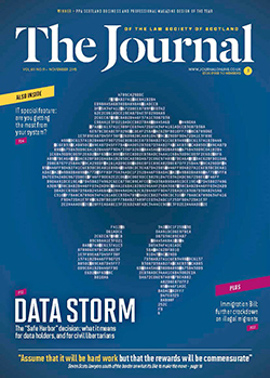Migrants: no way to turn?

At a time when practitioners are still trying to understand the intricacies of the Immigration Act 2014, Immigration Minister James Brokenshire has released a sequel in the form of the Immigration Bill 2015.
According to the minister, the bill will “build on the Government’s work since 2010 to crack down on abuse and build an immigration system that truly benefits Britain – by deterring illegal migrants from coming and making it hard for those already here to live and work in the UK”. From a cursory perusal, the Government appears intent on making life for illegal migrants unbearable in a bid to “encourage them to depart”.
As the Joint Council for the Welfare of Immigrants (JCWI) refers in its recent analysis (see JCWI.org.uk), the bill appears to indicate a focus on holding illegal migrants and those who seek to aid them, criminally responsible. It introduces several new offences for illegal migrants, as well as those employers and landlords who seek to circumvent the law and exploit migrants.
According to the Government’s Overarching Impact Assessment, the bill offers three key themes:
- To crack down on the exploitation of low-skilled workers with radical changes to deter employment of illegal migrants, as well as to solve the deep rooted issues of imposing penalties and measures on those who choose to work illegally.
- To ensure that illegal migrants are deprived of access to basic services. This includes the ability to find accommodation, hold a driving licence and open or maintain a bank account.
- To make it easier to remove illegal migrants, or those who overstay their visa, introducing the “deport first, appeal later” regime to most appeals.
This article highlights only the major changes proposed under the above three themes.
Illegal working
The bill introduces an offence of working illegally where the individual does not have leave to enter or remain.
Currently s 24 of the Immigration Act 1971 prevents working in breach of a condition prohibiting employment. A common example is an individual with leave to remain as a student, who is usually subject to a condition restricting the hours they can work during term time. This allows bona fide students to support themselves financially through their studies. Section 24(1)(b)(ii) deals with those who breach the condition by working excessive hours.
Interestingly, however, the Act does not identify a separate offence of working where the individual does not have leave to enter or remain in the UK. The proposed s 24B introduces such an offence. Offenders face a prison term not exceeding six months and/or a fine up to level 5 on the standard scale.
Section 24B(5) would encourage procurators fiscal to consider the possibility of recovering the illegal migrant’s wages or self-employed earnings under the Proceeds of Crime Act 2002.
Section 21 of the Immigration, Asylum and Nationality Act 2006 (employing a person subject to immigration control) is amended by adding the objective “or having reasonable cause to believe” test, to make it easier to prove the offence. The bill also increases the maximum prison term from two years to five.
Some employers avoid or ignore the requirement to ensure that an employee’s immigration status allows them to be employed. The bill envisages that such circumvention will be more easily prosecuted, though civil penalties will continue to be used with more routine cases. Interestingly, s 21 allows for a director or other officer to be prosecuted together with the business entity. This will no doubt be used more and more by the Home Office, in order to prevent an employer from simply liquidating their business and establishing another entity in its place.
For reasons that are not clearly explained, the Government takes the view that licensed premises tend to employ illegal migrants more routinely. The bill amends the Licensing Act 2003 so that businesses that employ individuals without the right to work may have their licence revoked. Employment of illegal workers will also be a factor in considering whether to issue a licence. Similar provision may be made for Scotland and Northern Ireland by regulations, amending devolved legislation.
Denying access to services
The Immigration Act 2014 introduced a “right to rent” regime whereby illegal migrants were prevented from accessing private sector rented housing. The 2015 Bill seeks to make it easier to evict illegal tenants, in some cases without a court order. Currently, landlords who do not adhere to the checks required may be liable for a civil penalty of up to £3,000 per illegal tenant.
The 2015 Bill seeks to introduce multiple new criminal offences for landlords and illegal migrants, targeting landlords and agents who exploit migrants and who repeatedly fail to carry out right to rent checks.
The Government’s rationale has been that migrants without valid leave should have no expectation to establish a settled life. It also argues that it is not fair to other UK residents that those with no legal basis to remain can compete for the UK’s finite housing stock.
As an extension to the denial of access to services to illegal migrants, the bill introduces a new offence of driving while being an illegal migrant: 1971 Act, new s 24C. Conviction may result in imprisonment not exceeding six months and/or a fine not exceeding level 5, and an offender’s licence and vehicle may be seized or retained by an “authorised officer”. Concerningly, the bill does not address the available remedies for individuals who are incorrectly identified.
The 2014 Act prohibited the opening of bank accounts by illegal migrants. The bill includes sanctions against them operating or continuing to operate existing accounts. Crucially, this also applies to migrants who had valid leave at the time of opening the account but whose leave has subsequently expired. This change will retrospectively include accounts opened prior to the 2014 Act.
Banks have been required to actively check whether a person has valid leave to reside in the UK. If it comes to light that the individual does not, the bank may notify the Home Office, which may apply to the court to freeze the account “except for essential living needs”.
No guidance has been proffered as to what constitutes “essential living needs”, or how such needs are to be calculated. Again there do not appear to be measures to protect individuals incorrectly identified. Will they be forced to expend time and legal fees in seeking reparation?
The introduction of these sanctions appears to be a draconian attempt by the Government to suffocate illegal migrants financially and emotionally. There are no provisions being introduced to assist migrants affected by the severity of the foregoing measures.
Restrictions on appeal rights
The most critical change proposed by the bill without a doubt is the scything of in-country appeal rights and the extension of the “deport first, appeal later” regime.
The 2014 Act condensed s 82 of the Nationality, Immigration and Asylum Act 2002 and reduced the number of in-country grounds from 17 to just four. Section 17(3) gave the Home Secretary new powers to remove those subject to deportation and allow only an out-of-country appeal right. The one caveat was that it could not be applied if the individual was subject to “serious irreversible harm” upon return or their human rights were otherwise breached disproportionately.
The bill plans to extend this regime to cover all human rights claims, by amending s 94B of the 2002 Act. It will not affect appeals brought under the Refugee Convention, article 3 of the ECHR, or reg 26 of the EEA Regulations 2006 (provided that the decision does not fall within reg 27, governing out-of-country appeal rights).
Practitioners will be familiar with the stringent threshold for “serious irreversible harm” already applied by the Home Office. Current guidance makes clear that it is not sufficient that the harm be either “serious” or “irreversible”.
Examples provided whereby it is unlikely that the test would be met include that there will be separation between parent and child, or between spouses, until the appeal is concluded.
According to the guidance, not even a family court case which is in progress is a factor sufficient to deter deportation. The guidance does not seem to take into account that usually in Scottish family procedure, the individual requires to be personally present, for example at options hearings and child welfare hearings. It is difficult to reconcile this major inconsistency. Will the immigration status of the party seeking or defending s 11 orders in terms of the Children (Scotland) Act 1995 require taking into account? What inference can a sheriff take from either party’s failure to appear?
The Home Office’s underlying principle incorporates that there will be no opportunity for individuals to strengthen or create additional human rights while waiting for the appeal to be determined in-country. However, there appear to be significant difficulties with this proposition. Given the current immigration tribunal budget cuts, there are likely to be significant delays in pursuing appeals out-of-country. Earlier this year the tribunal service in England & Wales required to draft in around 200 judges from the other First-tier Tribunal chambers to clear the backlog of immigration appeals. In Scotland, the Glasgow Immigration Tribunal has cut the number of courts from eight to two. The prospect of families being separated during the appeal process is a cause for serious concern, as is the likelihood of incorrect decisions by inexperienced judges creating a further backlog owing to further appeals or judicial reviews.
Immigration has become one of the most convoluted and difficult areas of our law. As the Master of the Rolls commented in Sapkota v Secretary of State for the Home Department [2011] EWCA Civ 1320: “I regret that… immigration law has now become an impenetrable jungle of intertwined statutory provisions and judicial decisions, with the result that reasonable differences of opinion… are now perfectly possible. There is an acute need for simplification so that both immigrants and immigration officers may have a clearer understanding of their responsibilities and rights.”
Hostile intentions
The Government does not appear to be interested in phasing the measures in. This is indicative of the Home Secretary’s intention to create a “hostile environment” for illegal migrants. Conversely, it argues that the bill is compatible with Convention rights by stating that immigration control is “a means of protecting the economic wellbeing of a country”.
The bill received its second reading on 13 October. It is imperative that practitioners are up to date with the proposed changes in order to anticipate and deal with future scenarios that will require careful consideration and knowledge of the new policies. The bill will, without doubt, shift us into a new era subjugated by oppressive immigration laws.
In this issue
- Appropriate adults and defence agents: who does what?
- Buying from a housing association: why consent matters
- Harassment: a civil claim?
- A welcome abroad: EYBA in London
- Reading for pleasure
- Opinion: David Faith
- Book reviews
- Profile
- President's column
- ScotLIS gets the green light
- People on the move
- Storm over Safe Harbor
- Light on a murky world
- Southern horizons
- Mediation minefield
- Migrants: no way to turn?
- The technological edge
- As our suppliers see us
- More rules to grapple with
- Fraud and divorce – a Scottish Sharland?
- What future for employment tribunal fees?
- Heading for a showdown on hard won human rights?
- Taxing question of relief
- Scottish Solicitors Discipline Tribunal
- How far can we rely on the register?
- All part of the game
- Law reform roundup
- From the Brussels office
- Poverty: a new front in the war
- Damage limitation: working it out
- Ask Ash
- A lawyer's lament
- Appreciation: Michael Scanlan






